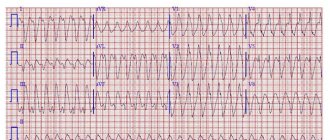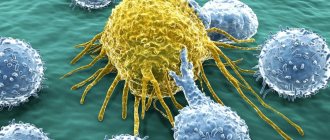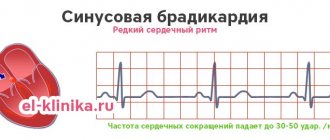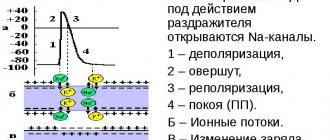Causes of heart murmurs, treatment
A heart murmur is a clinical manifestation of a nonspecific nature, which is not always a symptom of pathology.
For example, quite often a heart murmur in a newborn baby is a manifestation of the baby’s “transitional” state from intrauterine life to independent existence. However, this may also be a manifestation of pathology. Therefore, in addition to examination by a cardiologist, it is necessary to conduct a number of instrumental studies that will help make the correct diagnosis. Under no circumstances should the symptom be ignored. Possible causes of heart murmurs:
- congenital or acquired heart disease;
- VSD, endocarditis;
- infection of the heart muscle;
- damage to the aortic valve;
- anatomical abnormalities;
- mitral stenosis;
- hypertension;
- acute form of pericarditis.
Causes of heart murmurs in adults that are not related to cardiac pathology include age-related changes, chronic stress and psycho-emotional stress, and excessive physical activity.
Congenital heart defects
Classification. Several classifications of congenital heart defects have been proposed, common to them is the principle of subdividing defects according to their effect on hemodynamics. The most general systematization of defects is characterized by combining them, mainly according to their effect on pulmonary blood flow, into the following 4 groups.
I. Defects with unchanged (or slightly changed) pulmonary blood flow: anomalies of the location of the heart, anomalies of the aortic arch, its coarctation of the adult type, aortic stenosis, atresia of the aortic valve; pulmonary valve insufficiency; mitral stenosis, atresia and valve insufficiency; triatrial heart, defects of the coronary arteries and conduction system of the heart.
II. Defects with hypervolemia of the pulmonary circulation:
III. Defects with hypovolemia of the pulmonary circulation:
Clinical manifestations and course are determined by the type of defect, the nature of hemodynamic disturbances and the timing of the onset of circulatory decompensation. Defects accompanied by early cyanosis (so-called “blue” defects) appear immediately or shortly after the birth of the child. Many defects, especially groups 1 and 2, have an asymptomatic course for many years and are detected by chance during a preventive medical examination of a child or when the first clinical signs of hemodynamic disorders appear in the patient’s adulthood. Defects of groups III and IV can be complicated relatively early by heart failure, leading to death.
Why does a heart murmur occur?
Heart murmurs are systolic, diastolic and systolic-diastolic.
Systolic murmurs are heard at the apex of the heart and can be caused by cardiac pathology or be a symptom of a disease not related to the heart. Doctors most often associate systolic murmur at the apex of the heart in a child with adaptation to the environment.
Diastolic is always associated with heart pathology. The main causes are stenosis of the atrioventricular orifices, insufficiency of the aortic valve or pulmonary trunk.
Why does a heart murmur occur?
- blood regurgitation;
- high blood flow speed;
- the passage of blood into the dilated chamber of the heart through a deformed hole.
Why does a child's heart make noise?
There are many reasons, the most common:
- Abnormal state of venous return of the lungs - the pulmonary veins either do not communicate with the atrium on the right, or can fuse with the veins of the systemic circle.
- Pathology of the interventricular septum can develop independently or be combined with other cardiac pathologies.
- Coarctation of the aorta is a complex disease that requires consultation with a doctor: only a specialist can answer what a heart murmur at 2-3 years old means.
- Atrial septal disorder is a congenital heart defect characterized by a hole between the right and left atrium.
Heart murmur in an adult: symptoms
If we are talking about murmurs not related to cardiac pathology, then they can be combined with the following symptoms:
- fatigue, pale skin, weakness are inherent in anemia;
- weight loss, irritability, hand tremors are characteristic of thyroid diseases;
- mood swings, headache, dizziness, tachycardia indicate the presence of vegetative-vascular dystonia;
- swelling of the legs, shortness of breath, rapid heartbeat appear in late pregnancy.
Clinical manifestations of murmurs associated with cardiac pathology:
- rapid heartbeat, unstable blood pressure;
- dyspnea;
- increased sweating during sleep;
- “cold” hands and feet;
- swelling of the limbs;
- chest pain.
On our website you can make an appointment with a pediatric cardiologist and learn about the consequences of a heart murmur per month in a child. If necessary, the center can undergo a full range of examinations.
Heart murmurs in adults
Sometimes, when listening (auscultating) the heart, doctors talk about the presence of some kind of “murmur”. What are these sounds? Are they dangerous to health? Are these signs of heart disease? Let's try to figure it out.
The article was published in the new issue of the journal of the Center for High Medical Technologies.
Read the entire issue
The work of the heart is always accompanied by sounds. In the vast majority of cases there are two of them. They are called the first and second heart sounds because they follow each other and together make up the cardiac cycle. The sounds are associated with vibrations of various structures of the heart, as well as the muscles and walls of blood vessels during the movement of blood. The cardiac cycle consists of two large phases. The first phase, which begins with the first sound, is systole, when blood is expelled from the heart into large vessels (aorta and pulmonary artery) by the force of muscle contraction. Therefore, the first heart sound is also called systolic. The second phase begins with the second sound and is called diastole. At this time, the heart muscle relaxes, and the chambers of the heart are filled with a new portion of blood. Another name for the second sound is diastolic. Heart sounds have certain characteristics that characterize their duration, sonority, and time of occurrence.
All other sounds that occur while listening to the heart are usually called “murmurs”. The characteristics of noise depend on the general condition of a person, his constitution, rhythm frequency and many other factors. It is important to understand that any sound outside the normal two-tone cardiac cycle requires full evaluation and attention.
Noises are divided into two large groups: organic and functional.
The first group - organic murmurs - occur with various structural changes in the heart. This means that they are based on heart defects - congenital or acquired. The murmur may indicate, for example, damage to the heart valves - valve stenosis, valvular insufficiency, or a combination of both. Organic noise also appears in cardiomyopathy (expansion of the cavity of the heart chambers or hypertrophy (thickening) of the myocardium), endocarditis (inflammation of the inner lining of the heart (endocardium), acute pericarditis (inflammation of the pericardial layers lining the outside of the heart). All of these pathologies are very serious and life-threatening conditions requiring urgent medical intervention. Therefore, the presence of a “murmur” in the heart is an important signal for additional diagnostics and detection of the disease.
The second group of murmurs, the so-called functional murmurs, are either not associated with the heart or are based on anomalies that do not affect its functioning. The causes of functional noise are varied. They can occur as a result of vegetative-vascular dystonia, as well as during periods of rapid growth in children and adolescents. Also, sometimes they indicate some structural features of the human heart that arose during prenatal development. In this case, systolic murmur can accompany a person throughout his life. In addition, functional noises can be caused by the anatomical features of the large bronchi, located next to the aorta and pulmonary artery, which simply “squeeze” these vessels with accelerated blood flow through their valves. Long-term overstrain, both mental and physical, can contribute to the appearance of noise. One of the common causes of sound phenomena is pregnancy, during which the volume of circulating blood in the mother’s body increases for optimal blood supply to the fetus. In this regard, during pregnancy, changes in intracardiac blood flow also occur with the auscultation of a systolic murmur. In some cases, functional murmurs, although not associated with problems in the heart itself, often indicate other, sometimes serious, diseases. Functional noise can also appear against the background of metabolic disorders. For example, with anemia (decreased hemoglobin in the blood), thyrotoxicosis (excess of thyroid hormones) or fever.
Very often, the patient does not even suspect the presence of a heart murmur, much less the type and cause of its occurrence. A heart murmur can be diagnosed by a doctor by listening to it. You need to see a doctor if you have the following symptoms:
Symptoms of a heart murmur:
- Increased heart rate at rest and during light exercise.
- Labored breathing. Pay attention to your health if even walking causes you to feel short of breath.
- Chest pain that gets worse after exercise.
- Blue lips and fingertips that occur after fast walking or running.
- Swelling of the limbs.
The presence of one or more of the above symptoms is a reason to consult a doctor. And remember, a heart murmur is not always caused by a serious illness. But you should still undergo a timely examination to exclude such a disease or, if it is detected, to begin treatment in a timely manner.
Treatment and prevention
Therapy directly depends on the cause. For murmurs not associated with cardiac pathology, the main emphasis is on treating the underlying disease. In case of endocrine disorders, therapy and adjustment will be carried out by an endocrinologist. If anemia causes noise, the help of a therapist is necessary. Treatment of murmurs associated with cardiac abnormalities is the responsibility of a cardiologist. In this case, both conservative therapy and surgical intervention may be required.
The main prevention will be a healthy lifestyle, including a balanced diet, feasible physical exercise, 8 hours of sleep, preventive intake of vitamins in the spring and autumn, and giving up bad habits.
If you have any questions or need advice from a specialist, please use the registration form on the website. Our specialist will help you understand the problem and tell you what functional heart murmurs are. Registration is available 24 hours a day.
Related services: Cardiac Check-up Diagnosis of heart rhythm disorders by ECG monitoring
Diagnosis and further actions
If you or your child are diagnosed with a systolic murmur, this means that it is necessary to undergo additional examinations in order to identify the specific cause of this phenomenon.
The following diagnostic procedures are used:
- electrocardiography (ECG);
- Holter 24-hour ECG monitoring;
- chest x-ray;
- echocardiography (ultrasound examination of the heart);
- functional load tests (bicycle ergometry, step test);
- magnetic resonance or computed tomography.
They do appropriate laboratory tests, which include general and biochemical blood and urine tests, rheumatic tests, coagulogram and other specific studies.
In addition, the patient will need to consult a rheumatologist, allergist, and endocrinologist. If no organic changes are detected, then the person is simply put under control. This means that he needs to periodically come to the hospital for preventive examinations. General restoratives (physical therapy or physiotherapy) are also prescribed. If serious pathologies are detected, the patient is prescribed treatment.









